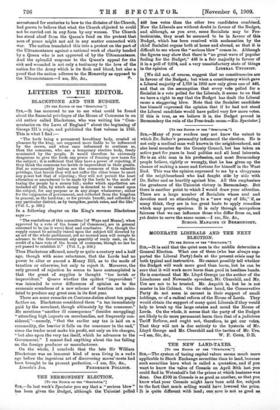LETTERS TO THE EDITOR.
BLACKSTONE AND THE BUDGET.
130 THE EDITOR OP THE "SPECTATOR."]
SIR,—It has occurred to me to see what could be found about the financial privileges of the House of Commons in an
old author called Blackstone, who was writing his " Com- mentaries on the Laws of England" about the beginning of George III.'s reign, and published the first volume in 1765. This is what I find :—
"The lords being a permanent hereditary body, created at pleasure by the king, are supposed more liable to be influenced by the crown, and when once influenced to continue so, than the commons, who are a temporary elective body, freely nominated by the people. It would therefore be extremely dangerous to give the lords any power of framing new taxes for the subject; it is sufficient that they have a power of rejecting, if they think the commons too lavish or improvident in their grants. But so unreasonably jealous are the commons of this valuable privilege, that herein they will not suffer the other house to exert any power but that of rejecting ; they will not permit the least alteration or amendment to be made by the lords to the mode of taxing the people by a money bill ; under which appellation are included all bills, by which money is directed to be raised upon the subject, for any purpose or in any shape whatsoever either for the exigencies of government, and collected from the kingdom in general, as the land-tax ; or for private benefit, and collected in any particular district, as by turnpikes, parish rates, and the like." (Vol. I., p. 169.)
In a following chapter on the King's revenue Blackstone says :—
" The resolutions of this committee [of Ways and Means], when approved by a vote of the house [of Commons], are in general esteemed to be (as it were) final and conclusive. For, though the supply cannot be actually raised upon the subject till directed by an act of the whole parliament, yet no monied man will scruple to advance to the Government any quantity of ready cash, on the credit of a bare vote of the house of commons, though no law be yet passed to establish it." (Vol. I., p. 308.) Thus Blackstone affirmed, nearly or quite a century and a half ago, though with some reluctance, that the Lords had no power to alter or amend a Money Bill, as to the mode of
taxation or otherwise, but only to reject it. Moreover, the only ground of rejection he seems to have contemplated is that the grant of supplies is thought "too lavish or
improvident." Quaere whether the epithet " improvident " was intended to cover differences of opinion as to the economic soundness of a new scheme of taxation not calcu- lated to produce any great sum in its first year.
There are some remarks on Customs-duties about ten pages farther on. Blackstone considered them "a tax immediately paid by the merchant, though ultimately by the consumer."
He mentions "another ill consequence" (besides smuggling) "attending high imposts on merchandise, not frequently con- sidered,"—namely, "that the earlier any tax is laid on a commodity, the heavier it falls on the consumer in the end," since the trader must make his profit, not only on his charges, "but also upon the very tax itself, which he advances to the Government." I cannot find anything about the tax falling on the foreign producer or manufacturer.
On the whole, I conclude that the late Sir William Blackstone was an innocent kind of man living in a rude age before the ingenious art of discovering mares'-nests had been brought to its present perfection. Sir, &c.,






























































 Previous page
Previous page